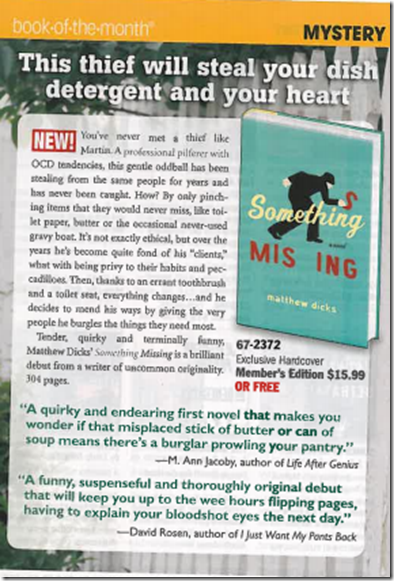This afternoon I spoke at a local retirement community, discussing SOMETHING MISSING and the process by which the novel was written. I read a little bit from the book, talked about my life and the means by which I found an agent and got the book published, and answered a number of interesting questions from a group of older but very astute individuals.
One man asked me if I had ever known a thief like Martin, or if I had committed any crimes in my own past. I told him that my life was sadly free of any major crimes, and while I have known people with nefarious dealings in my youth, I’ve never actually known a burglar.
Or more precisely, I’ve never known to have known a burglar. After all, unless a thief is caught, I suspect that most, if not all, of his or her friends and family are unaware of any potentially criminal activities.
As we left the event, my wife reminded me of a criminal indiscretion from my past that I can use at future speaking engagements if I am once again asked if I have a criminal history. It was a story that my Best Man, Bengi, told during his toast at our wedding.
When I was about 19-years old, I was living with Bengi in a townhouse in Attleboro, Massachusetts. He was attending college and I was managing a McDonald’s restaurant. We were two young guys living on our own, doing dumb things, and this was one of those occasions.
Around 2:00 in the morning, we were driving home from a night out when we passed by a shoe store in the center of town. The employees of the store had forgotten to take in their display of shoes from the previous day, so there on the sidewalk was a table loaded with footwear.
Being young and foolish, I proposed that we take the shoes and the table. Bengi quickly agreed.
We arrived home that night with dozens of shoes, but as we began to sort them, declaring who might get which pair, we realized that we hadn’t stolen a couple dozen pairs of shoes, but twenty-four left-footed shoes.
And a pretty nice table.
Unable to think of anything to do with two dozen left-footed shoes (we tried), we stuffed them into a closet and forgot about them.
A year later, we decided to clean out our closet and came across the shoes. Because Bengi can’t stand to throw anything away, he proposed that we return the shoes to the store. I agreed, providing that we could also include a letter explaining our actions and apologizing for the transgression. I crafted a note explaining what we had done, apologizing for our crooked ways, and asking the employees of the store to find it in their hearts to forgive us. “If forgiven,” I asked, “please send us a signal letting us know.”
I signed the letter, Matty and Bengi.
A week later we returned to the store to see if the employees had in fact left us a sign. We didn’t expect it, but they had.
Hanging in the store window was a large smiley face, and above each eye were eyebrows made form the words Matty and Bengi.
We had been forgiven.
Bengi ended the story here during his toast, but there’s more to the story. The table that we had stolen was never returned, and a year later when we were moving out of the townhouse, going our separate ways, we found that there were several things that we needed to divide, items that we had purchased (or in the case of the table, stolen) together. We decided to put these items into a pile and draft them in the same manner that an NFL or NBA franchise drafts players for their team.
I recall having to decide between taking the stolen table and a bottle of champagne. Because I was going to be living out of my car for an extended period of time, effectively homeless, and would later be renting a room from a family of Born Again Christians, I decided upon the champagne, reasoning that my space was limited.
I drank the champagne with friends that night after Bengi had moved out and onto Connecticut.
More than fifteen years later, the stolen table sits in Bengi’s mudroom. His kids’ shoes can often be seen piled atop it.
In pairs this time.


